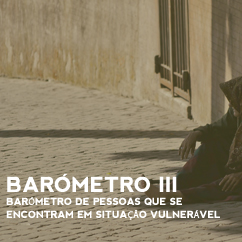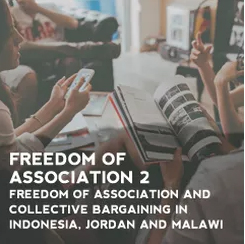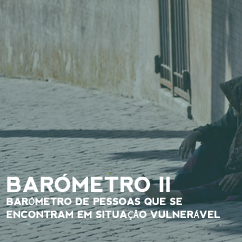Aquisição de Serviços de investigação sobre as respostas comunitárias às situações de pobreza e exclusão
Investigadora
Este projeto decorre das conclusões do estudo longitudinal realizado por uma equipa do DINAMIA’CET-Iscte para a EAPN ao longo de dez anos – Barómetro do Observatório de Luta Contra a Pobreza na Cidade de Lisboa – e que culminou com a publicação, em 2022, do livro Uma imensidão de vidas – dez anos de percursos de pobreza em Lisboa. Uma das conclusões apontava para a necessidade de se conhecerem e avaliarem “projetos suscetíveis de provocarem ruturas com a situação existente e com as tendências de desenvolvimento “instaladas,” conduzindo às mudanças no sentido da construção de formas alternativas de luta contra a pobreza e exclusão social.” O referido estudo identificava quatro das referidas cinco áreas como críticas para a quebra ciclos de pobreza, elencando alguns aspetos chave para cada uma dessas áreas. Neste enquadramento global, e ainda segundo as especificações do Caderno de Encargos, importa cumprir o seguinte plano de atividades: 1. Sinalizar respostas comunitárias, em diferentes áreas, cuja vertente de atuação seja o combate à pobreza e exclusão social na cidade de Lisboa; 2. Identificar e caraterizar Boas Práticas no combate à pobreza e exclusão social em Lisboa; 3. Apresentar critérios que possam configurar o que se entende por “Boas Práticas” no combate à pobreza e exclusão social na cidade de Lisboa, considerando as perspetivas e propostas das: a. organizações que promovem intervenções de combate à pobreza; b. pessoas visadas pelas intervenções de combate à pobreza e exclusão social. 4. Compreender os fatores de sucesso e os fatores de risco de 5 Boas Práticas identificadas e o seu historial biográfico. 5. Divulgar percursos de inclusão social das pessoas em situação de pobreza e exclusão social, através de 5 narrativas digitais. 7. Construção de uma Infografia sobre o que pode ser considerado uma “Boa Prática” em projetos de combate à pobreza e exclusão social.
Informação do Projeto
2024-04-24
2025-08-23
Parceiros do Projeto
- DINAMIA'CET-Iscte (GEC) - Líder
Barómetro de Pessoas que se encontram em situação vulnerável – Fase IV
Investigadora Responsável
Esta pesquisa iniciada em 2011 conta com três vagas de entrevistas concretizadas (a primeira em 2011, a segunda em 2014 e a terceira em 2017), possibilitando seguir neste período de tempo um painel de 47 pessoas que se encontravam em situação de vulnerabilidade e produzir três relatórios que contribuíram para uma compreensão aprofundada dos processos sociais em jogo através da interpretação e (re)construção das trajetórias de vida destas pessoas. Tal como na Fase III, o objetivo central do Barómetro nesta Fase IV assenta na compreensão dos processos que acentuam ou quebram ciclos de vulnerabilização, por via da análise do acesso e da apropriação de recursos disponibilizados pelas políticas públicas, mas também dos recursos individuais e das capacidades de projeto das pessoas que constituem o painel. Tendo por base as noções de tempo e mudança, importa: - Descrever o tipo de mudança que ocorre, em quem e no quê, em que momento e em que contexto, identificando-se os aspetos essenciais e as inter-relações entre eles; - Analisar de que forma e porquê as mudanças ocorrem, verificando como os indivíduos se posicionam no momento presente, (re)interpretam a sua trajetória de vida e projetam o seu futuro, e que recursos individuais e sociais são mobilizados face às oportunidades que lhes são oferecidas/negadas; - Interpretar a natureza e o sentido destas mudanças.
Informação do Projeto
2020-06-04
2022-03-30
Parceiros do Projeto
- DINAMIA'CET-Iscte (GEC) - Líder
LXHABIDATA – Públicos vulneráveis
Investigadora Responsável
O Projeto LXHABITA pretende monitorizar trimestralmente informação relativa a algumas situações de risco habitacional bem os principais recursos de políticas públicas, com vista a prevenir a exclusão social; compreender os processos associados à intervenção social na mobilização de quartos/pensões enquanto resposta, bem como as trajetórias residenciais e as variáveis que dificultam o acesso à habitação; e contribuir para um planeamento mais informado da intervenção social a nível local, bem como uma definição mais rigorosa das políticas públicas.
Informação do Projeto
2019-10-26
2021-12-31
Parceiros do Projeto
- DINAMIA'CET-Iscte (GEC) - Líder
Barómetro de Pessoas que se encontram em situação vulnerável - Fase III
Investigadora Responsável
Uma equipa tem conduzido, desde 2011, um estudo longitudinal, com uma abordagem qualitativa - Barómetro de Pessoas em Situação Vulnerável - no âmbito da Luta Contra a Pobreza no Observatório da Cidade de Lisboa, promovido pela EAPN Portugal. Com três conjuntos de entrevistas, foi possível acompanhar o mesmo grupo de pessoas em situação de vulnerabilidade ao longo do tempo, atendendo aos objetivos de pesquisa, especificamente: detectar processos de vulnerabilidade em relação a diferentes perfis de pobreza e suas repercussões no caminho da vida; analisando recursos individuais e disposições de ativação destinadas a construir autonomia económica e de vida; e avaliar o impacto das dimensões socioeconómicas, políticas e institucionais subjacentes à produção de recursos e as oportunidades concedidas aos sujeitos. Os critérios de seleção dos entrevistados basearam-se em dois eixos: perfis de vulnerabilidade que outros estudos demonstraram predominar na cidade de Lisboa com a visão de compreender a diversidade de situações e avaliar o impacto das políticas sociais em termos de características de situações de vulnerabilidade; e o eixo territorial, onde duas áreas em Lisboa foram identificadas devido aos índices socioeconómicos mais altos e diferentes em termos de índice de envelhecimento e juventude e tipo de habitação. Dado estes três eixos, uma distribuição de perfil foi obtida da seguinte forma: trabalhadores pobres e desempregados; cuidadores informais femininos; idosos em condições vulneráveis, incapazes de trabalhar devido a doença e não afiliados.
Informação do Projeto
2016-11-02
2017-10-31
Parceiros do Projeto
Estudo sobre os Impactos do Voluntariado da SCML
Investigadora
Os objetivos do projeto foram analisar: 1) o quadro regulatório do Voluntariado em SCML (suposições, princípios, objetivos e expectativas; 2) o grau de implementação dos princípios e objetivos subjacentes à implementação do Serviço Voluntário no SCML (pontos fortes e fracos, dificuldades e obstáculos, articulação com outros serviços internos, "boas práticas", fatores de inovação; 3.) os modelos organizacionais e processuais adotados (fatores de eficácia e eficiência, grau de satisfação; 4) os resultados e os impactos reais do Serviço Voluntário nas diferentes áreas de intervenção da SCML (resultados, graus de satisfação, confrontação com expectativas iniciais, 5) para produzir recomendações estratégicas. A metodologia foi baseada numa abordagem quantitativa, que possibilitará caracterizar motivações, níveis de satisfação, restrições, expectativas, percepção de resultados e impactos, etc., das diversas partes interessadas no âmbito do projeto (Beneficiários, Voluntários e Serviços do próprio SCML). Além disso, houve uma abordagem de natureza qualitativa, através da qual o conhecimento relativo a cada uma das dimensões da análise é explorado de forma abrangente. Neste caso, além do quadro dos Beneficiários, Voluntários e Serviços da SCML, uma fase também é proposta para coletar informações com as famílias dos beneficiários.
Informação do Projeto
2014-01-01
2014-01-01
Parceiros do Projeto
Freedom of Association and Collective Bargaining in Indonesia, Jordan and Malawi
Assistente de Investigação
No âmbito do projeto OIT-Sueco sobre liberdade de associação e negociação coletiva (GL0 / 09/60 / SID), para a Organização Internacional do Trabalho e sob a supervisão do Diretor Principal de Projetos, Pierre Guibentif, o DINÂMIA'CET-IUL realizará análises aprofundadas dos dados recolhidos durante as missões de diagnóstico para a Indonésia, a Jordânia e o Malawi (a serem fornecidos pela equipe do projeto), realizando as seguintes tarefas específicas:
- Realizar uma análise descritiva dos aspectos qualitativos e quantitativos dados recolhidos no campo durante a missão de diagnóstico na Indonésia;
- realizar uma análise descritiva dos dados qualitativos e quantitativos recolhidos no campo durante a missão de diagnóstico na Jordânia;
- realizar uma análise descritiva dos dados qualitativos e quantitativos recolhidos no campo durante a missão de diagnóstico para o Malawi.
Informação do Projeto
2013-10-31
2014-01-31
Parceiros do Projeto
Barómetro de Pessoas que se encontram em situação vulnerável - Fase II
Assistente de Investigação
Uma equipa tem conduzido, desde 2011, um estudo longitudinal, com uma abordagem qualitativa - Barómetro de Pessoas em Situação Vulnerável - no âmbito da Luta Contra a Pobreza no Observatório da Cidade de Lisboa, promovido pela EAPNPortugal. Com três conjuntos de entrevistas, foi possível acompanhar o mesmo grupo de pessoas em situação de vulnerabilidade ao longo do tempo, atendendo aos objetivos de pesquisa, especificamente: detectar processos de vulnerabilidade em relação a diferentes perfis de pobreza e suas repercussões no caminho da vida; analisando recursos individuais e disposições de ativação destinadas a construir autonomia económica e de vida; e avaliar o impacto das dimensões socioeconómicas, políticas e institucionais subjacentes à produção de recursos e as oportunidades concedidas aos sujeitos. Os critérios de seleção entrevistados basearam-se em dois eixos: perfis de vulnerabilidade que outros estudos demonstraram predominar na cidade de Lisboa com a visão de compreender a diversidade de situações e avaliar o impacto das políticas sociais em termos de características de situações de vulnerabilidade; e o eixo territorial, onde duas áreas em Lisboa foram identificadas devido aos índices socioeconómicos mais altos e diferentes em termos de índice de envelhecimento e juventude e tipo de habitação. Dado estes três eixos, uma distribuição de perfil foi obtida da seguinte forma: trabalhadores pobres e desempregados; cuidadores informais femininos; idosos em condições vulneráveis, incapazes de trabalhar devido a doença e não afiliados.
Informação do Projeto
2013-09-18
2015-03-31
Parceiros do Projeto
Avaliação externa da execução técnica dos projecto financiados pelo Programa Escolhas 4ª geração
Assistente de Investigação
N.A.
Informação do Projeto
2011-02-09
2013-01-31
Parceiros do Projeto
Statistical analysis of databases under the Étude de préparation d’une Opération de réhabilitation urbaine en la Médina de Meknès
Investigadora
Análise estatística no âmbito do Estudo de preparação de uma operação de reabilitação urbana da medina de Meknès, em Marrocos.
Informação do Projeto
2011-01-01
2011-12-31
Parceiros do Projeto
Impactos dos Acordos de inserção no Desempenho do RSI (entre 2006-2009)
Investigadora
Este projecto tem como objectivo central identificar os impactos dos acordos de inserção no desempenho do RSI. A par deste objectivo central e com o intuito de esclarecer de forma aprofundada os diferentes impactos dos acordos de inserção procurar-se-á:
§ Identificar a diversidade das problemáticas da pobreza e exclusão social que caracterizam os beneficiários do RSI;
§ Identificar as capacidades de autonomização e os principais elementos de dependência do público atendido;
§ Identificar a adequação dos recursos e oportunidades que têm sido disponibilizados, do ponto de vista da estruturação dos projectos de vida, e a sua adequação às situações de exclusão;
§ Identificar e compreender a percepção dos beneficiários sobre o processo de inserção social e dos acordos de inserção.
Informação do Projeto
2011-01-01
2013-12-31
Parceiros do Projeto

 English
English





